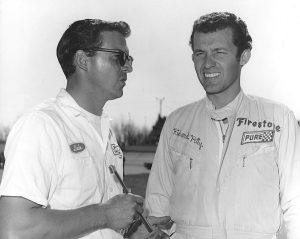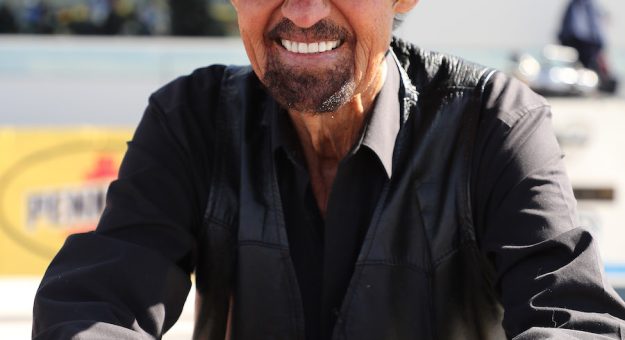Richard Lee Petty – the son of a farmer, racer, mechanic, moonshiner and millworker – never intended to become stock car racing’s most-beloved icon.
While growing up as a teenager during the early 1950s, the first jobs handed to Petty and his cousin, Dale Inman, were to change the oil, air the tires and change the spark plugs on Lee Petty’s No. 42 Oldsmobile race car in the single-car shed known as Petty Engineering.
Winning NASCAR races was everything for the Petty family, as it meant putting food on the table.
When Richard Petty turned 21 on July 2, 1958, his driving career began through a car frame and a pile of car parts set aside behind the shop. Through hard work and many late nights, a race car was born.

“One day, I wanted to try it (in July 1958),” Petty said. “We went to Columbia, S.C. It was me, Dale and Red Myler. Daddy, Maurice and them went to Asheville (N.C.) to race around a baseball field (at McCormick Field) there on a Thursday night. I wound up sixth a couple of laps down. On the way back, between Columbia and Rockingham, I said, ‘I think I’m going to like this dadgum driving part.’ Up to that time, I didn’t know. Once I ran that first race, I said, ‘This is what I want to do.’”
Petty’s first ride at Columbia Speedway came in a NASCAR Convertible race.
“This dadgum driving part” Petty referred to led to the most successful career in NASCAR history. Over a 35-year span from 1958 through 1992, he amassed 200 Cup Series victories, won seven Daytona 500s and earned seven series championships.
He has received countless accolades, including inductions into many Halls of Fame such as in the NASCAR Hall of Fame in 2010 and the National Motorsports Hall of Fame in 1998.
Petty, who turns 86 on July 2, is as gracious about his accomplishments today as he was when he scored his first NASCAR victory at the Charlotte Fairgrounds on Feb. 28, 1960.
Petty’s initial checkered flag actually came on June 14, 1959, at Lakewood Speedway in Atlanta, but the second-place finisher protested and he was dropped to second place after a recheck of the scoring. The driver who protested the win was his dad.
“Daddy was driving a hardtop and I was in a convertible in that race,” Petty said. “At that time in 1959, the factories had all left NASCAR because of some dispute over rules or something. That happened many times through the years. The promoters were giving $500 if you had a current year model car and won the race. That was daddy’s excuse. He said, ‘We can make $500 more if I win instead of you winning.’ Up to that point, second was the best I had ever run. I was OK with it. The first- and second-place money went home with us to Level Cross.”
NASCAR’s greatest driver has met presidents, kings, queens and numerous dignitaries as well as movie stars and music legends. Still, he’s never changed. He is the same humble, down-to-earth man he was when he signed his first autograph more than six decades ago.
“Well, you have to remember when I first went to the race track there might have been three- or four-thousand people there,” Petty said during his induction into the NMPA Hall of Fame in 1998. “For somebody to come up and ask for an autograph, I was always surprised. I guess I felt really good about it. I found out when you stop and sign an autograph, it’s giving something back, and to see the thrill in the fans just makes me feel good.”
While Petty is a hero to fans around the world, there’s one individual he considers a personal hero who paved the way for his phenomenal path in life.
“As far as all of those that I’ve met, I’ve admired a lot of people,” Petty said. “I guess my dad was the only hero I really thought about. He did a little bit of everything to make a living. Then he started racing. I look back and say, ‘Why me?’
“Why did the good Lord put me with Lee Petty, who was in the racing business and made a success out of it. I was able to enjoy that and help spread that. And the good Lord put all these people around me to make it happen. There’s no such thing as the word ‘I.’ I can’t do anything. There’s nothing you can do by yourself. Everyone around me made it happen.”
Since making his 1,184th and final Cup Series start at Atlanta Motor Speedway on Nov. 15, 1992, Petty’s legacy has taken a new role, that of ambassador for the sport he has helped make so popular.
